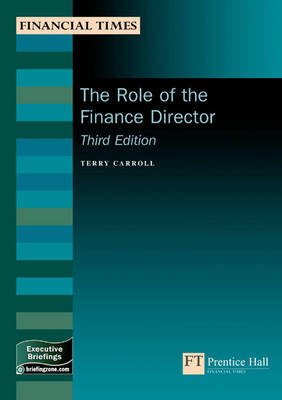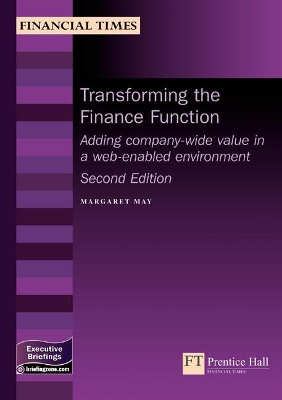MB Executive
5 total works
Businesses are changing, and so must the role of Finance Director. No more just the keeper of accounts, you are now often the guardian of the company's commercial strategy and an integral part of the planning and shaping for the future. The Role of the Finance Director is essential reading for all Finance Directors. It will give you a clear picture of the latest trends and thinking in the field, and provide you with stimulating ideas of the shape of things to come. Contents include: The Finance Director as: *Director and strategist *Financial and treasury manager *Auditor and corporate governance manager *Planning and development manager *Resource and relationship manager *Quality manager *Caring manager *Professional Plus *Examination of different industries & sectors *Practical examples throughout
Role of the Finance Director/Transforming the Finance Function Pack
by Terry Carroll and Margaret May
Published 22 April 2002
"By the year 2005, the finance function as we know it will have changed almost beyond recognition. Transaction processing will be simplified, standardised, routine streamlined and automated. That’s 60% of finance’s current responsibilities about to disappear."
Gregory Hackett, Co-Founder of the US-based Hackett Group
The days of the traditional number-crunching finance department are numbered. Increasingly, world class companies are demanding that their finance function add positive value instead of draining revenue. Transaction processing and control account for 84% of their total activities. The function is not only spending little time on value-creating activities such as decision support and future planning, but it is also consuming a significant proportion of company’s revenues.To rise to the challenge, finance departments must completely transform their activities. But how?
Essential reading for all Finance Directors,this bestselling briefing – now fully revised in a new edition – provides you with a complete toolkit to shift the role of the finance function from corporate scorekeeper to value generator. You will gain a thorough understanding of the extensive range of new techniques needed to fulfil this role and ensure that your finance department is central to your company’s future success.
New to this edition:
new analysis of IT, shared service centres and outsourcing, balanced scorecard, shareholder value, beyond budgeting, best value
new case studies
Contents:
Introduction
PART 1 THE TWENTY-FIRST-CENTURY FINANCE FUNCTION
Finance in the twenty-first-century organization
The process of transforming the finance function
PART 2 THE TECHNOLOGY-DRIVEN FINANCE FUNCTION
Shared service centres
Outsourcing
Information management delivering business intelligence
PART 3 VALUE-BASED MANAGEMENT
Delivering shareholder value/best value
Valuing intangible assets/intellectual capital
PART 4 BEYOND TRADITIONAL BUDGETING
Scenario planning, forecasting and resource allocation
The balanced scorecard
Benchmarking
PART 5 EXECUTIVE SUMMARY
Gregory Hackett, Co-Founder of the US-based Hackett Group
The days of the traditional number-crunching finance department are numbered. Increasingly, world class companies are demanding that their finance function add positive value instead of draining revenue. Transaction processing and control account for 84% of their total activities. The function is not only spending little time on value-creating activities such as decision support and future planning, but it is also consuming a significant proportion of company’s revenues.To rise to the challenge, finance departments must completely transform their activities. But how?
Essential reading for all Finance Directors,this bestselling briefing – now fully revised in a new edition – provides you with a complete toolkit to shift the role of the finance function from corporate scorekeeper to value generator. You will gain a thorough understanding of the extensive range of new techniques needed to fulfil this role and ensure that your finance department is central to your company’s future success.
New to this edition:
new analysis of IT, shared service centres and outsourcing, balanced scorecard, shareholder value, beyond budgeting, best value
new case studies
Contents:
Introduction
PART 1 THE TWENTY-FIRST-CENTURY FINANCE FUNCTION
Finance in the twenty-first-century organization
The process of transforming the finance function
PART 2 THE TECHNOLOGY-DRIVEN FINANCE FUNCTION
Shared service centres
Outsourcing
Information management delivering business intelligence
PART 3 VALUE-BASED MANAGEMENT
Delivering shareholder value/best value
Valuing intangible assets/intellectual capital
PART 4 BEYOND TRADITIONAL BUDGETING
Scenario planning, forecasting and resource allocation
The balanced scorecard
Benchmarking
PART 5 EXECUTIVE SUMMARY


